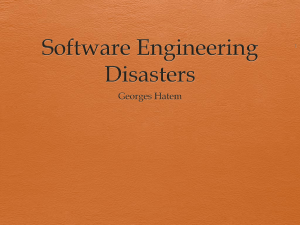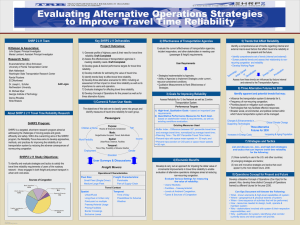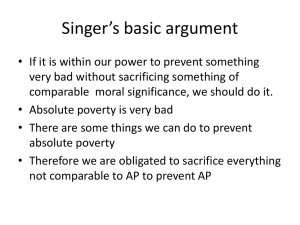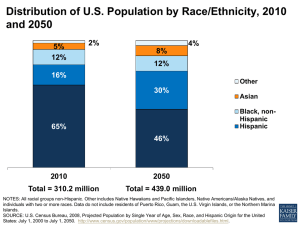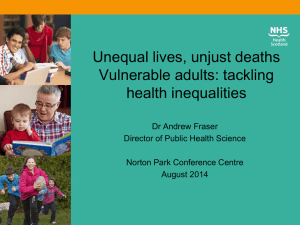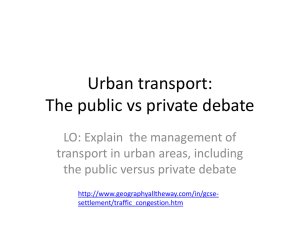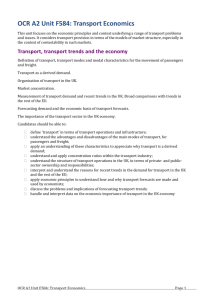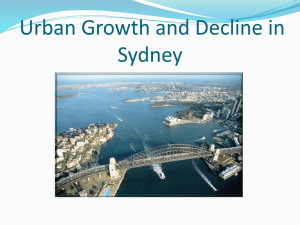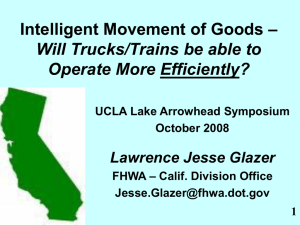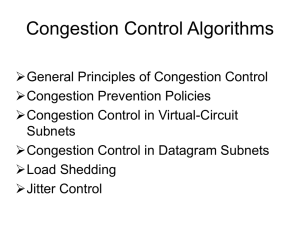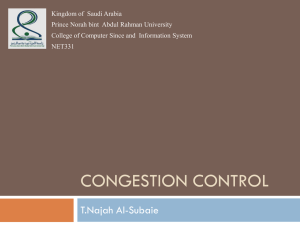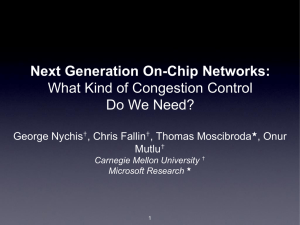2. Day 4. Session 1. Incheon 26-28 September_Cornie
advertisement
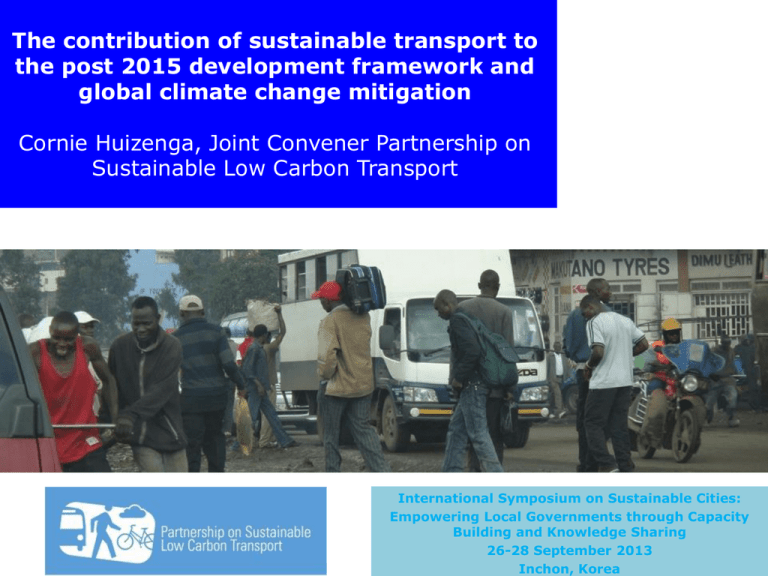
The contribution of sustainable transport to the post 2015 development framework and global climate change mitigation Cornie Huizenga, Joint Convener Partnership on Sustainable Low Carbon Transport International Symposium on Sustainable Cities: Empowering Local Governments through Capacity Building and Knowledge Sharing 26-28 September 2013 Inchon, Korea Part 1 SLOCAT PARTNERSHIP 4/13/2015 2 The SLoCaT Partnership Integrate Sustainable Transport in Global Policies on Sustainable Development and Climate Change 80+ Members: International Organizations – Government – Development Banks – NGOs – Private Sector - Academe African Development Bank (AfDB) *African Transport Policy Program (SSATP) *Alliance to Save Energy *Asian Development Bank (ADB) *Believe Sustainability *CAF-Development Bank of Latin America * Cambridge Systematics * Center for Clean Air Policy (CCAP) * Centre for Environment Planning & Technology (CEPT), Ahmedabad *Center for Science and Environment (CSE) *Center for Sustainable Transport (CTS) Mexico * Center for Transportation and Logistics Studies (PUSTRAL), Gadjah Mada University * China Urban Transport Research Centre (CUSTReC) * Civic Exchange (CE) *Clean Air Asia (CAI-Asia)* Clean Air Institute (CAI) *Climate Focus *CODATU * Despacio *Deutsche Gesellschaft für Internationale Zusammenarbeit (GIZ) * Dutch Cycling Embassy * Ecofys * EMBARQ, The WRI Center for Sustainable Transport * Energy Research Center Netherlands (ECN) * European Bank for Reconstruction and Development (EBRD) * European Cyclists' Federation (ECF) * European Institute for Sustainable Transport (EURIST)* First African Bicycle Information (FABIO) *Fia Foundation *Fraunhofer- Institute for Systems and Innovation Research (ISI)* Global Environmental Facility (GEF) * Global Transport Knowledge Partnership (gTKP) * Global Urban Development (GUD) * Health Bridge * HSBC * Innovation for Center for Energy and Transportation (iCET) *International Council Local Environmental Initiatives (ICLEI) *Institute for Global Environmental Strategies (IGES) * Institute of Urban Transport India (IUTI)* Institute for Transport Policy Studies (ITPS)* Institute for Transport and Development Policy (ITDP) * Institute of Transport Studies (ITS), University of California, Davis * Inter-American Development Bank (IDB) * International Association for Public Transport (UITP) * International Energy Agency (IEA) * International Road Assessment Program (iRAP) *International Road Federation (IRF)* International Transport Forum (ITF) * International Union for the Conservation of Nature (IUCN) * International Union of Railways (UIC) * Korean Transport Institute (KOTI) * Ministry of Land Infrastructure Transport and Tourism, Japan (MLIT) *Mobility Magazine * National Center for Transportation Studies (NCTS), Philippines * Rockefeller Foundation * Society of Indian Automotive Manufacturers (SIAM) * Stockholm Environment Institute (SEI) *Sustainable Transport Africa *Tehran Urban and Suburban Railway Operation Company (TUSROC) * The Energy and Resources Institute (TERI) * Transport and Environment (T+E) * Transport Research Laboratory (TRL) * United Nations Center for Regional Development (UNCRD) * United Nations Department for Economic and Social Affairs (UN-DESA) * United Nations Development Program (UNDP) * United Nations Economic and Social Commission for Asia and the Pacific (ESCAP) * United Nations Economic Commission for Europe (UNECE) * United Nations Economic Commission for Latin America (CEPAL) * United Nations Environment Program (UNEP) * United Nations Human Settlement Program (UN-HABITAT)* University College of London, Department of Civil, Environmental and Geomatic Engineering * University of Transport and Communication (UTCC) Hanoi * University of Twente/ITC-Department of Urban and Regional Planning (UTC) * VEOLIA Transport * Victoria Transport Policy Institute * Volvo Research and Education Foundations (VREF) *Walk 21 *World Bank * World Business Council on Sustainable Development (WBCSD) * World Street * Wuppertal Institute for Climate, Environment and Energy * WWF International “The SLoCaT network is a model for other action networks because of its strategic vision and leadership that resulted in the major commitments on sustainable transportation at Rio+20” – NRDC 2013 review of Rio+20 Voluntary Commitments SLoCaT’s Role in Promoting Sustainable Low Carbon Transport Universal Access to Clean, Safe and Affordable Transport Sustainable Transport Policy Sustainable Development Policy Processes: SG Post 2015 Global Development Agenda Rio+20 Follow-up (SDGs) Sustainable Transport Finance Climate Change Policy Processes: • • • Implementation AWG-LCA AWG-ADP (Durban Platform) GEF 6 Sustainable Transport Programs and Projects Regional EST Forums: • • • Asia Africa Latin America SLoCaT Members SLoCaT 4/13/2015 4 Part 2 PROBLEM SETTING 4/13/2015 5 Continued Rapid Motorization By 2015 Non-OECD will overtake OECD in vehicle market China, now already the largest vehicle market Don’t overlook freight Freight OECD 2010-2050 Freight non-OECD 2010-2050 Urban Access Over 50% of urban trips in many of the African cities are on foot Rural Access • Rural road transport in Africa costs 3 to 5 times more than main road transport • Only one in three rural Africans has access to an all-season road. Those facing more than eight hours of travel to an urban center are effectively trapped in subsistence agriculture 1st Mile Farm/household Primary market Wider markets Air Pollution – Particulate Matter Globally: 3.2 million premature deaths and over 74 million years of healthy life lost Asia: 2.1 million premature deaths and 52 million years of healthy life lost 4/13/2015 2010 Global Burden of Disease, the Lancet 2013 10 Estimated population-weighted ambient air pollution levels - PM2.5 1990 → 2010: 10% increase in global population-weighted PM2.5 1990 → 2010: 50% increase in China population-weighted PM2.5 4/13/2015 11 Climate Change • Transport sector to contribute 21% of emission reduction to ensure 2 DGS by 2050 Climate Change: Black Carbon Diesel Exhaust Contains a Mix of Pollutants: Soot particles (PM), metals, smog-forming gases, carcinogens and many other chemicals - 75% of Diesel PM is black carbon • • • UNEP/ WMO Joint assessment: “We estimate that black carbon…is the second most important human emission in terms of its climate-forcing in the present-day atmosphere” 16 measures could reduce global warming by 0.5oC (0.20.7oC) in 2050, if implemented by 2030 (Diesel clean-up among the key measures) Complementary, annual health and crop benefits: – – 4/13/2015 2.4 million premature deaths (0.74.6 million) avoided; and Avoided loss of 52 million tonnes (30-140 million) of maize, rice, wheat and soybean 13 Road Safety • • • 1.3 million deaths per year, 20-50 million injuries 8th leading cause of death, 5th in 2030 unless effective action is taken Economic cost $ 2,240 billion, 3% of annual GDP Congestion Cost of congestion in USA estimated at $ 104 billion annually Congestion rapidly becoming worse in developing world! 4/13/2015 15 Part 3 SOLUTIONS 4/13/2015 16 Paradigm shift on development of Transport Predict and Provide Build Roads to promote economic and social development Road safety 1.3 million deaths Air Pollution 3 million deaths (large part transport) Climate change – transport GHG fast growing Congestion Then Access not inclusive – large groups no access (urban and rural) Negative externalities of old paradigm: 6-10% of GDP Access: (Avoid + Shift + Improve) Expand/Improv e Transport infrastructure and services 4/13/2015 : Avoid unnecessary motorized transport + Shift Transport to most effective mode (people and goods) Now + Improve environmental performance transport 17 Travel Demand Management • • Vehicle quota’s in Singapore, Shanghai, Beijing, Guangzhou Congestion charging in Singapore, London, Stockholm, Milan Bus Rapid Transit 4/13/2015 19 Public Bike Schemes China: 119 Bike sharing Programs in 100+ cities with 500,000+ bicycles Wuhan – largest in the world – 94,000 bikes 4/13/2015 20 Fuel Economy 4/13/2015 21 Electric Vehicles Electric 2-wheelers now- China, Asia 4/13/2015 Electric 4-wheelers later, no global 22 leader Integrated Approach Improving Access (Infrastructure + services for all modes) through Avoid-ShiftImrove Improve road safety Reduce air pollution Lessen congestion Is cheaper IEA: A-S-I based approach can save $50 Trillion by 2050 because of reduced vehicle/fuel cost – infrastructure – operating costs 4/13/2015 Emit fewer GHGs 23 Part 4 TRANSPORT AND SUSTAINABLE DEVELOPMENT 4/13/2015 24 Transport and the Millennium Development Goals Passenger Eradicate extreme poverty and hunger Achieve Universal primary education Promote gender equality and empower women Transport Reduce Child Mortality Improve Maternal Health Combat HIV/AIDS, Malaria and other dieseases Ensure Environmental Sustainability Freight Develop a Global Partnership for Development Transport@Rio+20 Bike ride in support of sustainable, low carbon transport. June 8, 2012 Sustainable transport integrated in the outcome document: “transport and mobility are central to sustainable development” 15 voluntary commitments on knowledge, capacity, policy and financing: $ 175,000,000,0000 4/13/2015 26 Road Map for Sustainable Transport and Post 2015 development agenda Post 2020 Climate Change Regime Ad hoc Working Group on the Durban Platform for Enhanced Action Action Agenda 2012 - 2017 Secretary General Ban Ki-Moon Energy Food & Nutrition TWG on SG action plan on sustainable transport 26 member High Level Panel on Post 2015 Development Agenda Post 2015 Sustainable Development Framework Water Oceans UN Task Team on Post 2015 Agenda Transport Convening Mechanism Sustainable Transport Antartica Outcome document: “The Future We Want” (Sustainable Transport) 30 Country UNGA Open Working Group on SDGs “UN Friends Group Sustainable Transport” Key Processes on Sustainable Transport and Sustainable Development Economic and Social Commission UN General Assembly Belgium and Guyana (lead reform discussion ECOSOC) High Level Poli cal Forum on Sustainable Development (Successor to CSD, Brazil and Italy lead development of HLPF format) 1 2 UN-Secretary General led: High Level Group on Sustainable Transport 3 High Level Panel of Eminent Persons on Post 2015 Development Agenda Friends of Sustainable Transport (Led by UK, Indonesia and Liberia) 3 High Level Panel of Eminent Persons on Post-2015 Development Agenda UN- Task Team on Post 2015 Development Agenda 4 Open Working Group on Sustainable Development Goals 5 Regional Environmentally Sustainable Transport Forum Country (Party) led: 4 Open Working Group on Sustainable Development Goals (SDGS) Intergovernmental commi ee for financing of sustainable development (Hungary and Kenya led) (Norway and Kazakhstan led) (internal UN-team) Friends on Sustainable Transport (Netherlands , Kenya and Thai led) High Level Group on Sustainable Transport (HLG-ST) 1 Technical Working Group (TWG) on Sustainable Transport (supports HLG-ST) 5 2 Regional EST Forums (Africa, Asia, Europe and La n America) UNCRD or WHO led in coopera on with Regional Commissions Na onal and City Transport Policies 4/13/2015 28 SLoCaT Submission to Open Working Group on Sustainable Development Goals Universal Access to Safe, Clean and Affordable Transport for All Targe t Targe t Targe t Urban households are able to access jobs, goods and services within 30 minutes by public transport and/or walking and cycling and rural households have access to all weather roads; Traffic related deaths are cut in half by 2025 with an ultimate vision of near zero fatalities; Air pollution from passenger and freight transport is halved by 2025 and GHG emissions from transport peak globally latest by 2020 with an ultimate vision of 40-60% reductions by 2050 compared to 2005 levels. Access Economic Social Environmental How to look at transport in post 2015 context ? Do not look at transport solely through energy lens ! Acknowledge and respect institutional context of transport sector! Acknowledge economic (formal and informal) importance of transport! Transport is more than infrastructure ! How to optimize transport’s unique contribution? Combine enabling role with reduced negative externalities Enabling Global Institutional Framework “UN-Transport or Sustainable Transport4ALL” SLoCaT Partnership Oriented towards scaling up UN Friends of Sustainable Transport “SG High Level Group on Sustainable Transport” Sustainable Transport Action Network Regional Environment -ally Sustainable Transport Forums Develop political momentum on sustainable transport Multi-stakeholder cooperation UN coherence Contact: Cornie Huizenga cornie.huizenga@slocatpartnership.org For additional information see: http://www.slocat.net
